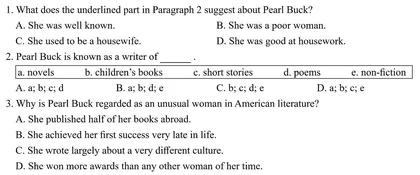Module 5 Great People and Great Inventions of Ancient China

跟踪导练(一)
阅读理解
One of the most popular literary figures in American literature is a woman who spent almost half of her long life in China, a country on a continent thousands of miles from the United States. In her lifetime she got this country’s most honored literary award, the Pulitzer Prize, and also the most prestigious (有声望的) form of literary recognition in the world, the Nobel Prize for literature.
Pearl Buck was almost a household word throughout much of her lifetime because of her literary output, which consisted of some eighty-five published works, including several dozen novels, six collections of short stories, fourteen books for children, and more than a dozen works of non-fiction.
When she was eighty years old, some twenty-five books were awaiting publication. Many of those books were set in China, the land in which she spent so much of her life. Her books and her life served as a bridge between the cultures of the East and the West.
Her background as the product of those two cultures made her into an unusually interesting and versatile (多才多艺的) human being. As we examine the life of Pearl Buck, we cannot help but realize that we are in fact meeting three different people: a wife and mother, an internationally famous writer, and a humanitarian (人道主义者). One cannot really get to know Pearl Buck without learning about each of the three. Though honored in her lifetime with the William Dean Howell Medal of the American Academy of Arts and Letters in addition to the Nobel and Pulitzer Prize, Pearl Buck as a total human being, not only a famous author, is a fascinating subject of study.
1. What does the underlined part in Paragraph 2 suggest about Pearl Buck?
A. She was well known. B. She was a poor woman.
C. She used to be a housewife. D. She was good at housework.
2. Pearl Buck is known as a writer of .
a. novels b. children’s books c. short stories d. poems e. non-fiction
A. a; b; c; d B. a; b; d; e C. b; c; d; e D. a; b; c; e
3. Why is Pearl Buck regarded as an unusual woman in American literature?
A. She published half of her books abroad.
B. She achieved her first success very late in life.
C. She wrote largely about a very different culture.
D. She won more awards than any other woman of her time.
4. What is the purpose of the text?
A. To introduce Buck to readers. B. To show Buck’s views on Chinese literature.
C. To offer information about Buck’s works. D. To discuss Buck’s influence on cultures.
阅读七选五
How to Change the World
You want to change the world, but you aren’t sure where to start. First, remember that changing the world can mean so many different things.
· Understand what’s wrong. 1 The world is such a big place, so you won’t be able to change much if you don’t understand what’s going on out there. Try to learn about what is happening both home and abroad.
· Know that change doesn’t come overnight. 2 Try to live your values each day, even if you don’t see much appreciable change on a day-to-day level. Work hard and don’t give up.
· Start small. Find ways to make a difference every day. It may feel as though you are just one tiny part of a huge system. At first, you almost certainly will be. Be patient. 3 Try to put your activism into practice and make it a reality.
· 4 Write letters to newspapers; post an article, video, or idea on the Internet. If you think that it is important and worthy of attention, try to raise awareness (意识) by telling as many people as you can.
· Consider a career (事业). Think about which sort of job might put you in the best position to change the world. 5 There are a lot of ways to get paid for adding value to the world. Start researching to find jobs in fields that make you feel valuable.
A. Read the news.
B. Spread the word.
C. All things begin small.
D. There are other ways to show your support.
E. Remember that you don’t need to do it alone.
F. You could be a teacher, a reporter, or something else.
G. Don’t expect to change the world with one big heroic act.
1. ______ 2. ______ 3. ______ 4. ______ 5.______
跟踪导练(二)
完形填空
In our daily life, we have too many things to deal with. It seems as if life is always tiring. However, whenever I feel 1 , I’m grateful to everything life 2 me and try to make the best of every day. I learnt this attitude towards life from the story of my friend Joanne.
In middle school, Joanne was always 3 with a big smile on her face, as if she was always 4 with what life offered her. But soon, things 5 changed. She passed away because of a serious 6 . Her smiles only exist in my memory. The last time I saw her in the hospital, she was terribly ill. However, she still 7 a warm smile and was happy about my 8 . I prayed (祈祷) for her recovery. 9 , she lost the battle against 10 at last.